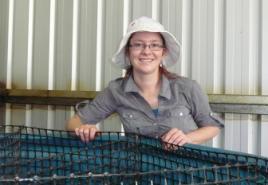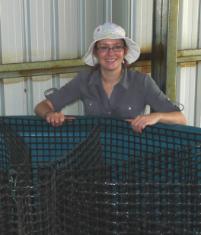Uni student helps evaluate Asian 'crab fattening' concept for Aussie conditions
Published on 07 Nov, 2012
Media Contact: viaFor Immediate Release
CQUniversity student Victoria Hammer recently completed a final-year project that she could really get her teeth into, by helping to evaluate the fattening and shell-hardening of wild-caught mudcrabs under aquaculture conditions.
In a project believed to be the first of its type in Australia, a Gold Coast fisherman in the Moreton Bay area is utilising an aquaculture tank for the crab fattening project. Water for the tank is sourced from the natural mangrove habitat and reticulated continuously to ensure its quality is maintained.

Victoria Hammer inspects the aquaculture tank used for fattening crabs
Click here to View/Download full-sized ImageMs Hammer has been drawing on her professional background as an analytical chemist to evaluate the quality of source water going in and discharge water coming out of the system, along with the health of the crabs.
The parameters monitored throughout the project were water quality, food consumption, mud crab growth and survival, and mud crab health. The pilot study is now complete and Ms Hammer is considering continuing her involvement as the project expands.
The fattening of mud crabs in Asia is common by alternative means such as bamboo cages. Aquaculture tanks are seen as more viable for Australian conditions where Aussie crabs can be over 900g compared to the smaller Asian crabs around 200-350g.
Ms Hammer lives on the Sunshine Coast. Having completed her degree in Environmental Health at CQUniversity, she's now considering options for employment or further study in this field.
"Mudcrabs are graded higher if they are full of meat and have harder shells, so it's been worthwhile getting involved the pilot stage of this project," she says.
"I've been looking into the environmental impact of the process and the health outcomes for the crabs and consumers. The project is now likely to expand at Moreton Bay."

LINK for a larger image
Click here to View/Download full-sized Image
Ms Hammer has previously worked in the sugar and oil/gas industries but is now considering new career and study options.
She says her Environmental Health degree provided the opportunity to undertake work placements (known as practicums) in the state government, local government and private industry sectors to apply knowledge gained from her university studies.
Ms Hammer says she has enjoyed the chance to make industry contacts through her professional membership of Environmental Health Australia, which is hosting a national conference at the Gold Coast in November.
"Being a flex studies student enabled me to study full-time by distance and work full-time while continuing to live at home on the Sunshine Coast."
As a distance student, Ms Hammer won the Keith M Harrower Award for Academic Excellence in Microbiology in recognition of the quality of her CQUniversity studies in 2011.
ENDS

